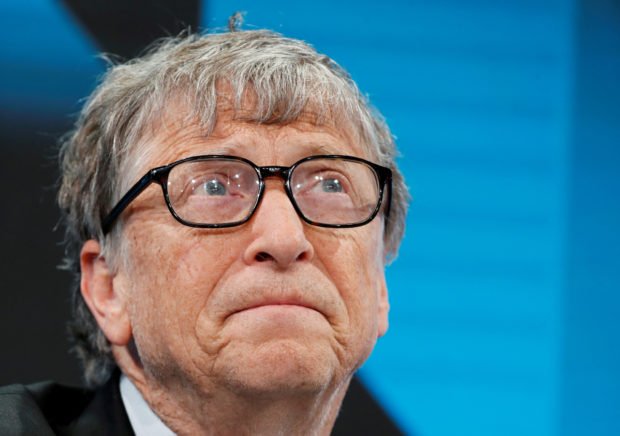
Bill Gates, Co-chair of Bill & Melinda Gates Foundation. Agencies via China Daily/Asia News Network
BEIJING — Microsoft co-founder Bill Gates discussed the possibility of a viral pandemic in a TED talk five years ago and recently shared his views on the worldwide coronavirus outbreak and why he believes the key to winning the battle is global innovation.
“The damage to health, wealth, and well-being has already been enormous. This is like a world war, except in this case, we’re all on the same side. Everyone can work together to learn about the disease and develop tools to fight it,” Gates wrote in a 6,300-word post last Thursday.
“I see global innovation as the key to limiting the damage. This includes innovations in testing, treatments, vaccines, and policies to limit the spread while minimizing the damage to economies and well-being.”
Gates believes most developed countries will be moving into the second phase of the epidemic in the next two months. He said that life would be “semi-normal” — that is to say, times would be abnormal but not as abnormal as during the first phase. People will be able to go out again, “but not as often, and not to crowded places”.
To offer a better sense of the gradual reopening in developed countries, Gates gave the example of Microsoft’s operation in China, which has roughly 6,200 employees.
“So far about half are now coming in to work,” Gates wrote. “(Microsoft China is) continuing to provide support to employees who want to work at home. They insist people with symptoms stay home. They require masks and provide hand sanitizer and do more intensive cleaning. Even at work, they apply distancing rules and only allow travel for exceptional reasons.”
The post on gatesnotes.com is titled “Pandemic 1,” a reference to COVID-19’s status as “the first modern pandemic”, as Gates put it. He said the pandemic will define this era in the same way that World War II did in its time.
“No one who lives through Pandemic I will ever forget it,” he wrote. “And it is impossible to overstate the pain that people are feeling now and will continue to feel for years to come.”
Continuing the World War II comparison, Gates cited the “amazing amount of innovation” that emerged from that era, including radar, torpedoes and codebreaking. He said he expected the same from the pandemic and he pointed to five categories of innovation: treatments, vaccines, testing, contact tracing and policies for emerging from lockdown orders.
Gates said widespread testing would be critical as life starts to return to normal. He points to the potential of new forms of testing, including a new Rapid Diagnostic Test that could provide results at home without sending a sample to a lab. Gates is also funding researchers conducting a mail-in nasal swab test in the region around Seattle, Washington.
In addition to testing, Gates said contact tracing is also important to stopping the spread of the virus: “China was where the first infection took place. They were able to use stringent isolation and extensive testing to stop most of the spread.”
China and South Korea required patients to turn over information about where they have been in the last 14 days by looking at GPS information on their phone or their spending records.
Gates said it is unlikely that Western countries will require this, speculating that most countries will use the approach that Germany is using, which requires interviewing everyone who tests positive and using a database to make sure there is follow-up with all the contacts.
Gates’ view on treatments for the virus is more pragmatic.
“Short of a miracle treatment, which we can’t count on, the only way to return the world to where it was before COVID showed up is a highly effective vaccine that prevents the disease,” he wrote. “Unfortunately, the typical development time for a vaccine against a new disease is over five years.”
Gates added that he agrees with public health officials who believe that large-scale vaccination is likely 18 months away, but it illustrated the uncertainty when he wrote, “it could be as short as 9 months or closer to two years”.
The pandemic has spread around the world, infecting more than 2.7 million people and killing more than 190,000.
Since the outbreak began, the Bill & Melinda Gates Foundation has committed more than $250 million to support development of diagnostics, therapeutics and vaccines and to help strengthen African and South Asian health systems, which help mitigate the social and economic impacts of the virus.
“The heavy cost of the pandemic for lower-paid and poor people is a special concern for Melinda and me,” Gates wrote. “The disease is disproportionately hurting poorer communities and racial minorities.
“Likewise, the economic impact of the shutdown is hitting low-income, minority workers the hardest. Policymakers will need to make sure that, as the (US) opens up, the recovery doesn’t make inequality even worse than it already is.
“At the same time, we are impressed with how the world is coming together to fight this fight. Every day, we talk to scientists at universities and small companies, CEOs of pharmaceutical companies, or heads of government to make sure that the new tools I’ve discussed become available as soon as possible. And there are so many heroes to admire right now, including the health workers on the front line. When the world eventually declares Pandemic I over, we will have all of them to thank for it,” Gates concluded.
For more news about the novel coronavirus click here.
What you need to know about Coronavirus.
For more information on COVID-19, call the DOH Hotline: (02) 86517800 local 1149/1150.